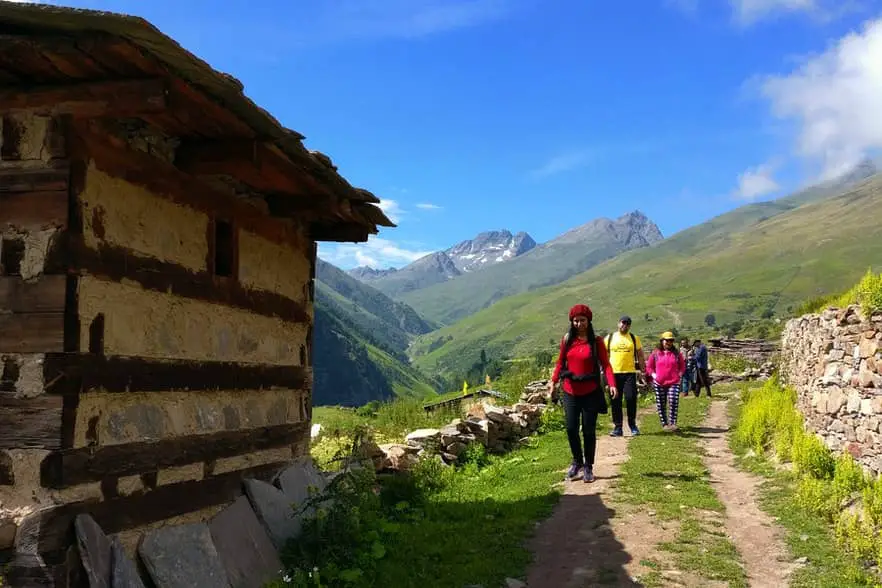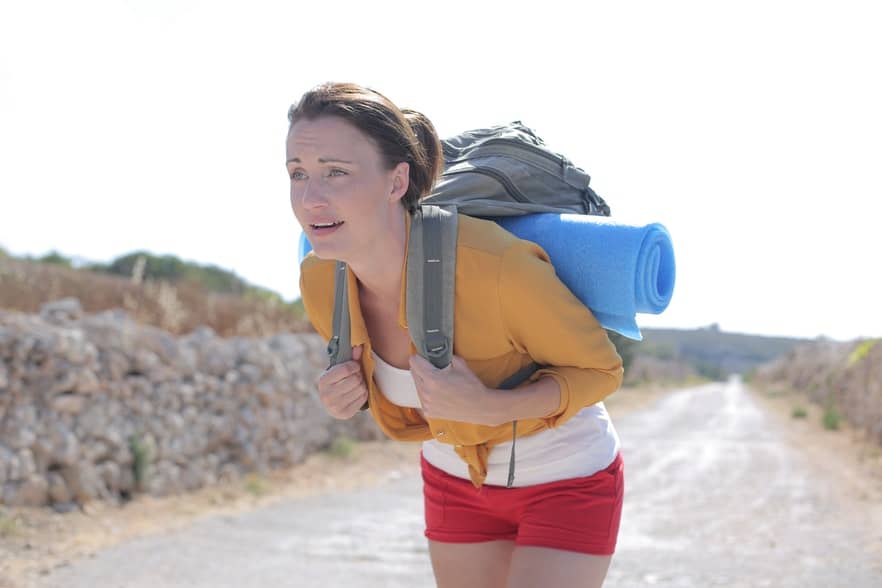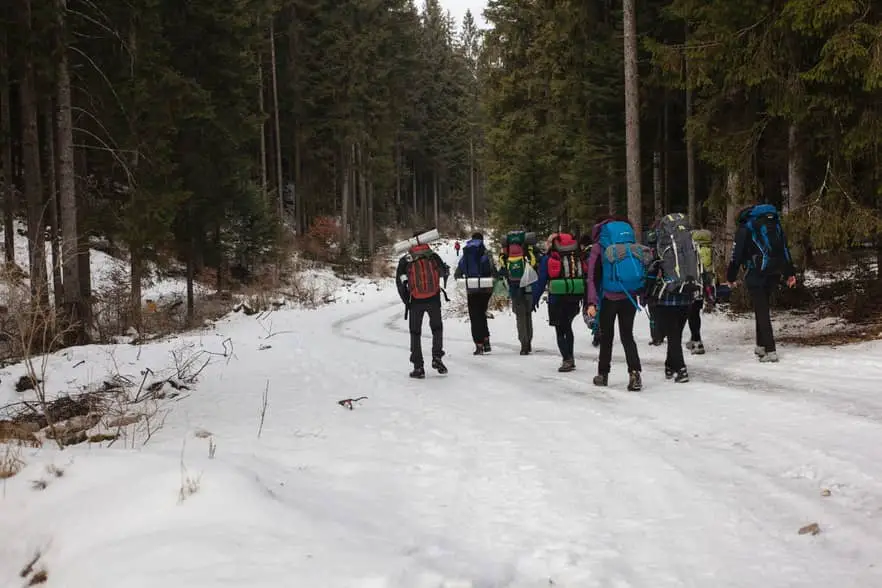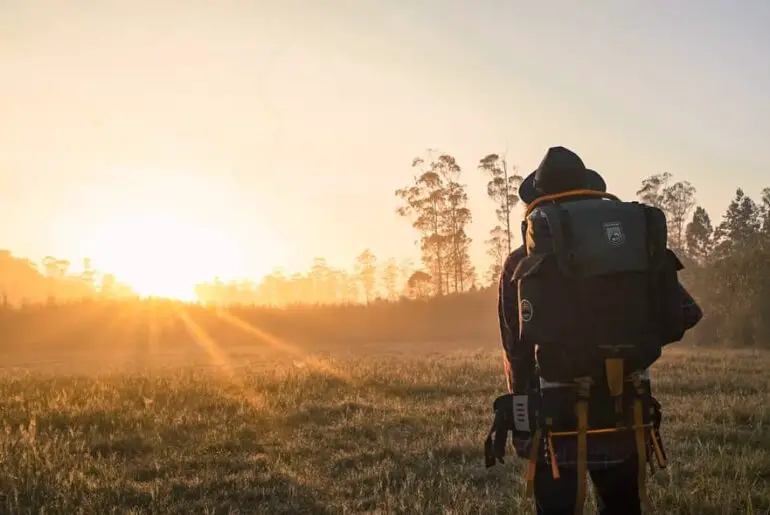Last Updated on January 30, 2023 by Rose Morah
Over the years, I have realized that hiking and backpacking are for those who are willing to take the leap, no matter their age, body size, or shape.
In this article, we will be discussing how to prepare for a hike or backpacking when you’re overweight or out of shape. We have also listed great backpacking and hiking tips for beginners.
- 1. Prepare for the hike physically
- 2. Prepare yourselves mentally
- 3. Have a positive mindset
- 4. Carry the right gear
- 5. Pack smart
- 6. Stay hydrated
- 7. Know how to deal with chafe
- 8. Don’t be overly obsessed with your appearance
- 9. Connect with other travelers
- 10. Backpacking does not always result in weight loss
- Final word
1. Prepare for the hike physically
How to prepare for a hike physically
If you are going to be hiking, exercising prior to your trip is important.
This does not mean that you have to hit the gym to attain a perfect weight or body shape. I have seen people who weigh 200 to 300 pounds making it through the trail.
There are many ways to train before embarking on a backpacking trip when you are out of shape, especially before difficult elevation gain hiking.
The following are some of the best exercises to help you prepare effectively before going on a hiking trip:
1. Cycling
When you go hiking, you need to be prepared to take uphill walks, which can be tiring, especially if you haven’t trained and worked on your leg muscles.
Cycling is mainly recommended because it helps give you uphill strength. It also helps prepare your legs and knee muscles.
Personally, I loved the exercise when I was starting my 6-week hiking workout plan. It helped keep me in reasonably good shape before the coming weeks of workouts.
2. Running
Running is an excellent way of strengthening your feet. It helps strengthen your legs and build aerobic endurance.
I realized over the years that whenever I go on hikes without prior running exercises, I often find it hard to pull off a number of miles. This is as opposed to when I do some running exercises before the trip.
| A few weeks before a backpacking trip, I usually run 5~10 miles. |
3. Treadmill exercises
Treadmill exercises are great, especially for backpackers who don’t like running. Personally, I do treadmill exercises when I don’t feel like taking a run or when I am training during the winter/rainy season.
Benefits of treadmill exercises for backpackers and hikers
- It helps improve your aerobic power.
- Improves your muscular endurance.
- When you feel tired from working out, it is a great way to help you relax through Zen Master Workouts.
4. Walking
Walking is an essential exercise for both beginner and experienced hikers and backpackers.
In your hiking workout plan, you should put some hours into walking. Be sure to take a walk at every opportunity you get. Walking can be done when you’re going to the mall, grocery, after work, e.t.c.
How to get the most out of your walking exercises
- Pack your backpacking bag with water bottles or with your gear and cover a few miles before the main trip.
This will toughen your skin and prepare you both physically and psychologically.
In my hiking workout plan, I usually have one day a week to train with my pack fully loaded and walk with it for not less than 10 miles. Nothing prepares you better than this.
Related: A Complete Backpack Packing Guide (And Backpacking checklist)
- Wear your hiking boots during your walking exercises.
This helps your feet get used to them before the actual trip.
Additionally, it helps you know your weak spots- the parts that tend to get blisters when you walk for many miles. Once you discover these weak spots, you can look for ways to help prevent the blisters and thereby minimize their likelihood of ruining your hiking trip.
Personally, I put a plaster on the weak points. I also tend to know when to stop and allow my legs to breathe.
Wearing hiking boots prior also helps you know the best shoes to carry and the ones that will be more comfortable.
- If possible, do your walks on uneven grounds.
This means walking on rocky paths, avoiding pavements, hilly trails, e.t.c. However, it can be hard to find such places, especially if you live in the city. You can hence start by the closest parks around your area.
So, you should start by searching for parks near you.
- Start with short-distance hikes.
Before going on long treks, you could first consider starting with short-distance hiking. This helps prepare the body for long tiring treks.
This will also help boost your confidence in your body’s abilities to interact and relate with nature, as well as prepare and open you up to long hiking and backpacking stretches.

5. Stairs exercises
Stairs exercises are great for strengthening your lower body. They also help tone your thighs, calves, and butt.
Climbing stairs when training for hiking has personally helped me build endurance and balance when backpacking.
Alternatively, you can exercise at the gym with a Stairmaster machine.
6. Bodyweight exercises
Doing bodyweight exercises helps you gain general strength, especially when you do exercises that target your weak points, thereby helping improve your hiking ability.
Best leg exercises that help improve your body movement on trails
Squats
- Jump squats
- Pistol squats
- Goblet squats
- Barbell squats
Squats also help protect your knees when hiking or trekking for many miles.
Deadlifts
- Kettlebell deadlifts
- Barbell deadlifts
Best muscles development exercises that help support your back when carrying your backpack
- Hanging leg raises
- Ab rollouts
- Side planks
- Shoulder shrugs
These exercises help strengthen your core, which makes it easier to carry your backpack on long treks.
| PRO-TIP Learn to listen to your body. Don’t push it too hard. When starting these workouts, start slow! Don’t do very intense workouts that may lead to injuries. |
2. Prepare yourselves mentally
Hiking/backpacking is a mental game! You will need to prepare mentally by training your brain to withstand challenging terrains. Some people train and physically look fit but end up giving up because they never train mentally.
Backpacking is not that easy. You will need to be prepared to sleep in cold camps, walk-in wet shoes or in intense heat with sweltering heat, and experience many harsh conditions.
But the good thing is, the experience changes the old you in a good way. And if you are not mentally ready, it is easy to give up and go back home.
3. Have a positive mindset
Being proud of, loving your body, and being grateful for what it can do is important.
Sometimes you are afraid of traveling due to being overly self-conscious, which is quite a silly feeling.
You need to take the leap.
As you will soon find out, the experience is so worth the insecurities you have to overcome to get there. You can never trade it for anything.
4. Carry the right gear
If you are hiking, you need to get a good set of trekking poles.
Trekking poles not only add comfort and stability in difficult terrains, but they are also good for the knees when you are climbing or going downhill.
Trust me. They’re worth having.
And while backpacking, you will certainly be carrying all of your gear in and out of the wild and hiking 4 to 20 miles in a day.
Having a pair of sturdy hiking boots will, without a doubt, give you good ankle support, especially on rough terrains.
And again, after walking for a long distance, you might notice the sole of your feet starts to become awfully sore.
This could be due to the pressure put on your feet by the weight of your body.
You’ll need to ensure that you create a good amount of recovery time after the trek to rest your heels.
And another thing, try soaking your feet in tea tree oil or in salty water to relieve the foot aches.
Last but not least, carry some lightweight shoes for evening walks.
5. Pack smart
Packing tips for beginners:
1. Choose the right backpack
The backpack should be well-fitting.
For instance, you’ll need to ensure that the hip belt is well padded to balance the weight and avoid overloading your shoulders.
You will want most of the weight on your back to be around your upper hip and not on your shoulders.
If you choose to go with the traditional pack, ensure that you measure your torso to get the appropriate belt size.
2. Carry less

You should consider ultra-light packing – carry the lightest and simplest gear.
When you load your backpack with less, you are able to move faster, navigate easily around and even make easier interactions with other travelers and the locals.
Your pack content will depend on the type of travel and the functions you want your pack to support.
Consider carrying only the essentials, but most importantly, pack extra clothes. Why?
If you have a plus-size body, you may not be lucky enough you get your exact size out there, depending on the average size of the locals.
Alternatively, pack interchangeable clothing to minimize the pack load.
6. Stay hydrated

Taking a good amount of water and fluids will undoubtedly keep your muscle fiber and fascia in supple and help get rid of cramps.
Needless to say, you should take a good amount of water before and during your trip.
Roughly one liter after every hour should be sufficient due to the heat, and high altitude experienced when hiking/backpacking.
You may, however, need to avoid sports drinks due to their high salt levels, which will likely leave you dehydrated.
7. Know how to deal with chafe
After trekking for a couple of miles, you might start to get some blisters on your inner thighs due to the hip chafe.
You may hardly walk without pain thereafter.
To remedy that, apply a body glide anti-chafe meant for thighs.
Alternatively, you can consider bike shorts or Lycra running shorts, which are also great.
8. Don’t be overly obsessed with your appearance
Never let yourself worry about how you look, even when you are in shorts or swim trunks.
In other words, don’t let your appearance hinder you from having fun.
Sometimes when you are overweight or out of shape, your body will draw some attention, but this will only be for a short while.
Most people don’t really care.
As a matter of fact, most people will judge you on your personality and not your physical appearance.
Enjoy the experience, live, laugh, and most importantly, don’t let your size hold you back even for a moment.
That’s right. Just roll with it and see what happens.
9. Connect with other travelers

Connecting with other travelers creates a sense of identity from your shared goals, and not because of looks or appearance.
And another thing, when you are in the same boat, you build connections with others.
You also find other great travelers with who you bond, make friends, and give each other moral and mental support along the way.
10. Backpacking does not always result in weight loss

Don’t always expect to lose weight whilst traveling.
When you’re traveling, it’s hard to keep track of a healthy lifestyle.
From binge eating and taking lots of beer on the road, you might end up gaining rather than losing weight.
But there is also the likelihood that you could shed some weight through the gap year and on long-term travel because you will certainly burn pounds from long treks.
it is always important to maintain a healthy diet even when you are traveling abroad by consuming only healthy and well-balanced foods.
Final word
When someone attempts to comment or say something you believe is an intentional putdown, you could easily turn it around on them like…
“Hey Fatty, where are you from?”
Reply, “I come from somewhere where people are polite. Where are you from?”
Lastly, remember that we experience life through our bodies, and it will be a shame if you hate yours.




